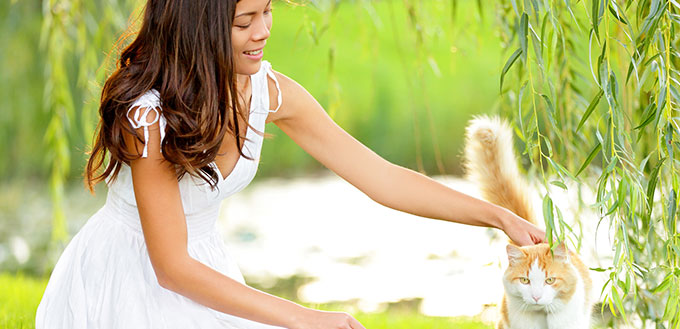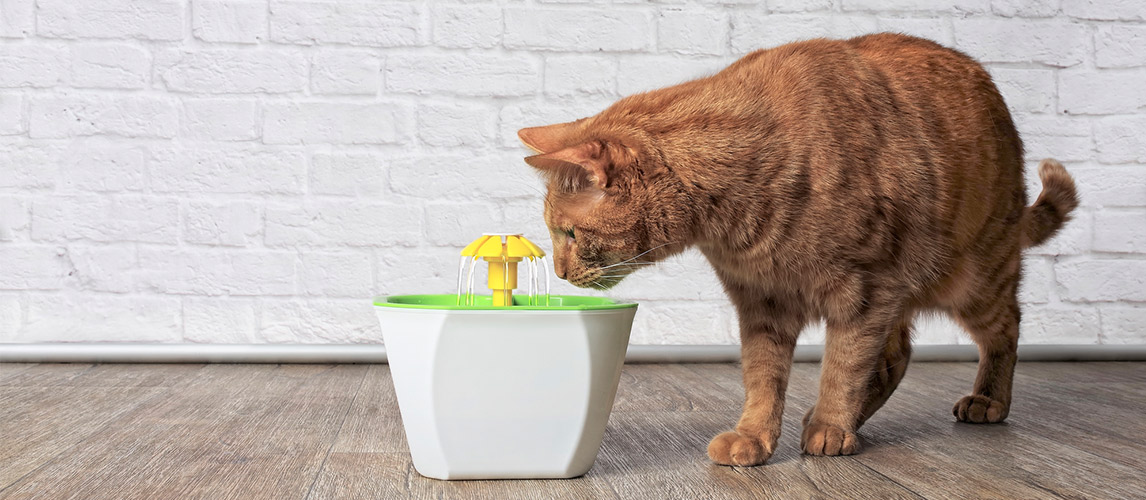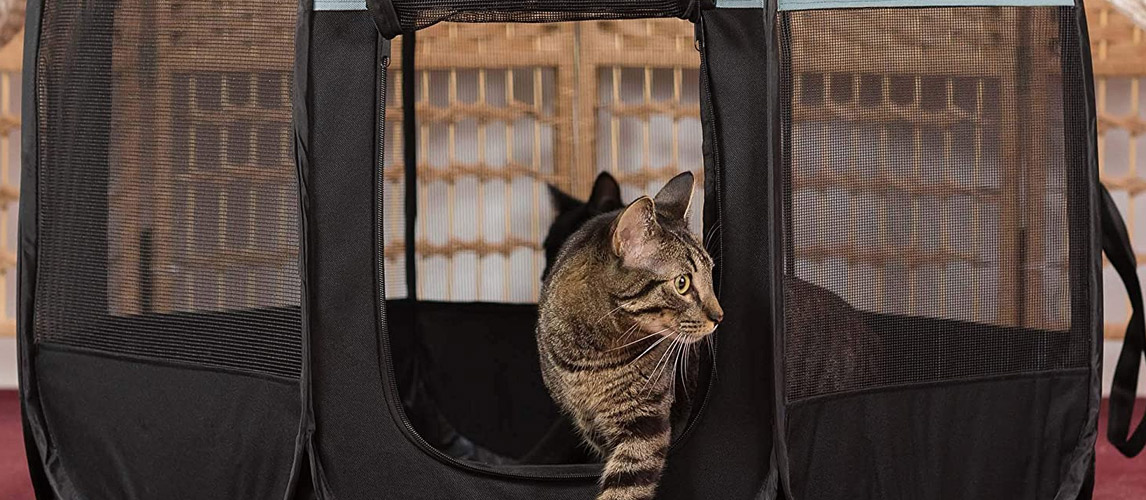Summer is the season of fun. The days are long and hot, so it can be tempting to spend more and more of your time outside. But what about your cat? While you are getting a tan and enjoying yourself, your cat is also being affected by the summer. Both indoor and outdoor cats may benefit from the sunnier weather, but they can also both struggle in the heat. If you want a happy, healthy kitty in every season, here are some tips to help you through the summer.
Keeping Cool
The most obvious problem faced by cats is that hotter weather means hotter cats. Your kitten is literally covered in fur from head to paw, which can make even 75 degrees feel more like 80 or 85. How would you manage in summer if you had to wear a jumper and jeans all day, every day? This is even worse if you live in the sunbelt. Spare a thought for the poor Texan kitties who sometimes have to struggle through temperatures in the 100s!
Overheating is a serious risk for all animals. It can result in extremely sudden death if not dealt with. People should be extremely careful about leaving animals in enclosed spaces like cars, and it is a good idea to memorize the symptoms of overheating, particularly in summer. To help you be the best cat parent you can be, here are some symptoms of a cat overheating:
- A Fast Heartbeat
- Drooling
- Vomiting
- Rapid Breathing
- Dilated Pupils
- Lethargy
- Yowling
If you at all suspect your cat is suffering from even one of these symptoms, you should take steps to help them immediately. It is better to cool them down when they might not need it, than to take the risk that they could suffer, or even die. Here are some essential tips for having a coolest cat on the block:
- Never leave an animal inside a vehicle on a hot day, even for a brief moment. It only takes a few minutes for temperatures to spike to over 100 degrees, and you might be gone longer than you planned.
- Put their bed in the shade. This might seem obvious, but it can be harder than you think. The sun moves, so a spot of shade at eight in the morning might be directly in the noonday sun. This is particularly important if you leave to go to work for most of the day.
- Make sure there is enough water. When temperatures reach the 90s, cats need a fresh bowl of water every couple of hours. If you are going to be out, try putting out two bowls – one frozen for later and another normal, fresh bowl with ice cubes.
- Many cats do not drink enough on hot days because they don’t realize that they need to up their intake. A great option is to invest in cat water fountains. Cats instinctively know that running water is generally safer than stagnant water. This, alongside the improved taste of oxygenated water and the enticing sound, can encourage your cat to drink more water.
- Don’t restrict them, even if you think you are doing it for their own good. It might be tempting to restrain your cat in the shade. But, as mentioned above, shade can move. Given some freedom, your cat will find the best place to cool down on their own.
- Pay attention to the ground and other materials near your cat. Metal isn’t the only danger. Asphalt and concrete heat up very quickly. We get to wear shoes that protect our feet, but cats’ paws are more vulnerable.
- Grooming is more important than you think. It might be easy to overlook, but knot-free hair lets air pass against the skin much more comfortably than tangled fur.
- An immediate fix if your cat looks uncomfortable is to use a cool damp cloth. It isn’t a good idea to over correct temperature very suddenly. If you are worried your cat is overheating, suddenly putting them in front of an air conditioning unit, or a freezer, could be quite a shock to their little hearts.
Check out our review of the Best Cat Beds.

Dealing with Allergies and Pests
The second major problem with summer is cat allergies. If you are one of the many humans who suffers from hay-fever or any other allergies, then you understand how difficult the season can be. Runny noses, itchy skin, or constant sneezing can make you feel trapped indoors. Well, cats can have similar allergies, complete with their own symptoms, and on top of this, there are more pests than ever to irritate your feline friends. Generally, symptoms of pests or allergies can include:
- Swellings, such as around their paws
- Chewing or intense licking at body parts
- Changes in snoring due to an inflamed throat
- Diarrhoea
- Sneezing
- Coughing
- Difficulty breathing, or wheezing
- Red, itchy or runny eyes
Not all of these symptoms will appear at once, and they can also explain a number of different medical problems. Consult a vet if you have even the smallest concerns. It can take a while to figure out what your cat is allergic to. Even if it clearly related to summer, it could be almost anything, including:
- Wild food, such as berries or mushrooms
- Pollen and dust
- Fleas and other pests
- Medicines
- Your summer beauty products, like a particular perfume you only wear in summer
You may also like our guide on the Best Hypoallergenic Cat Food.
As you can imagine, suffering from any of these allergies is terrible. Think about your poor kitty suffering, sniffling and scratching all summer, and you’ll want to do anything you can to make it all better. If you know your cat has an allergy, or if you are concerned about pests and other irritants in summer, here are some tips to help your cat feel great all summer.
- Keep on top of the cleaning. I know it is a pain, but the best advice is to provide clean bedding every week and vacuum twice every week to prevent dust build-up. Don’t just vacuum the basics, focus on all soft furnishing that shares your cats environment, like the curtains.
- Keep a clean cat. It isn’t just the environment that needs to be clean, your cat could benefit from a more regular bath. This can cool your cat down as well as removing the allergens and pollen that may have accumulated on their skin. Excessive bathing can dry out your pet’s skin so ask for advice about the best cat shampoo.
- Get rid of all allergens. This might seem obvious, but can be more difficult than you expect. There are some things that are difficult to control, like dust, pollen and wild berries. Make the effort to get to know your local flora and fauna.
- Focus on flea prevention. Although some cats have a worse reaction to fleas than others, fleas are always bad for cats. It is worth asking your vet for flea control products and instigate a regular check for your pets, even if only one of them ever goes outside. One pet with fleas can infest all your animals.
- Listen to your vet. Food allergies often result in specific dietary changes, like prescriptive protein diets. Sticking to these strict rules will do your cat a world of good and your vet will know what is best.
- Consider using a dust-free, chemical-free litter. There are many special products that can help you keep dust and chemicals to a minimum. Some of these are specific to your cat’s daily life, and others will just generally help you keep the home environment dust-free.
- There are many medications that your vet may suggest once you know the cause of the allergic reaction, such as cortisone, antihistamines, and natural remedies. There isn’t one pill or one oil that can fix everything, so listen to your veterinarian.
Take a look at our review of the Best Flea Treatments For Cats.

Safety First
Summer is the time for freedom and fun, but this shouldn’t come at the cost of safety. There are all sorts of great summer activities that you might want enjoy with your cat, like barbecues and picnics. Maybe you have an outdoor cat, which already comes with year-round risks, who spends more time outside in summer? Or maybe summer creates additional stresses on your cat? No matter what your circumstance, it is worth thinking about your cat’s safety this summer.
There are 80 million pet cats in the U.S, and 35% of them live outdoors. This is at least 10 million cats wondering around outside every day. Outdoor cats face dangers all year, such as:
- Predators
- Poisons
- Disease
- Cars
- Other cats
That trade off between safety and the freedom cats fundamentally crave is a difficult one, and it can be even more difficult in summer. The longer days encourages your cat to stay out much longer, take more risks, such as drinking from potentially unsafe water sources, and there are more poisonous plants in hotter climates. If you have an outdoor cat, but are concerned about their safety, here are some tips that should help you keep them safe:
- Chip your cat for peace of mind. If you know where your cat is, you can go check on them and, sometimes, just knowing they aren’t lost in the woods or down by a river is enough to keep you calm when they are a little late for dinner.
- Keep their claws. It is very tempting to declaw your cat automatically, but if you want your cat to be able to defend themselves or climb a tree to escape a predator, don’t take away their main weapon.
- Vaccinations are crucial. So many diseases are preventable. Make sure your cat is protected for as many as possible. Outdoor cats often have additional vaccinations that indoor cats don’t need, so check with your vet.
- Spay or neuter your cat. Spaying or neutering your cat isn’t just about making sure you don’t end up with unexpected kittens. The procedure also helps to modify their behavior. Seeking a mate can make cats take more risks, wonder further from home and get into more fights with other cats.
- Make water accessible. Be smart about where you put your water. Don’t put a stagnant bowl of water in direct sunlight or where other animals may use it to bathe, but don’t let your cat get stuck outside without access to water. Try providing fresh bowls of water outside every couple of hours, or invest in a cat flap.
- Know your neighborhood. Do you have a nearby river? Or a factory? How clean is your street? Does the nearby bar mean glass is littered everywhere? Even if your area seems safe, it is a good idea to regular take a walk of your own to get to know every nook and cranny, and maybe pick up a few hazards. Remember to look at the environment from your cat’s perspective. Look at the walls they might climb and the holes they might sneak into.
Another health and safety issue for summer is stress. Family holidays, fireworks, thunderstorms and social events can all contribute to your cats anxiety. Keeping your cat happy and safe isn’t limited to their physical needs, and a stressed cat can cause themselves serious harm. Here are some tips to help your cat have a stress-free summer:
- Ask your neighbors to notify you when they are planning fireworks so that you can prepare your cat’s environment. Find the quietest area of your home and prepare it so that your cat has a hiding place and escape routes. Both these things help cats to feel more control over their environment.
- Investigate different natural calming remedies, such as lavender oil. Be careful not to overpower your cat’s sense of smell as it is much more sensitive than yours.
- Some animals who are frightened of thunderstorms may be reacting to a build up of static electricity. It sounds odd, but try using an unscented dryer sheet to wipe down your cat’s fur to remove some of the static.
- Prepare your cat for long car journeys by taking them on small car journeys first and building up their tolerance. Use a roomy carrier for cats. They must be able to move about and the carrier should be secured to avoid sliding around.
- Water on any journey is essential. Cars get very very hot, so make sure your cat always has access to water and is in a cool area of the car.
- Don’t accidentally trap your cat in a room full of strangers when you invite your friends around. If you are going to let your cat roam free, make sure they always have an escape route. It is a good idea to provide a perch for them to watch you from a distance. Cats enjoy the control this gives them.
Check out our article on 10 Holiday Safety Tips for Cats
Sources:
- Pet Tips: Safe Summer Fun, The MSPCA–Angell
- Summer Fun in the Sun: Hot Weather Safety Tips for Your Pets, The ASPCA
- Summer Pet Safety Tips: Keeping Dogs, Cats and Other Pets Safe in Hot Weather, Best Friends Animal Society
Note: The advice provided in this post is intended for informational purposes and does not constitute medical advice regarding pets. For an accurate diagnosis of your pet's condition, please make an appointment with your vet.







